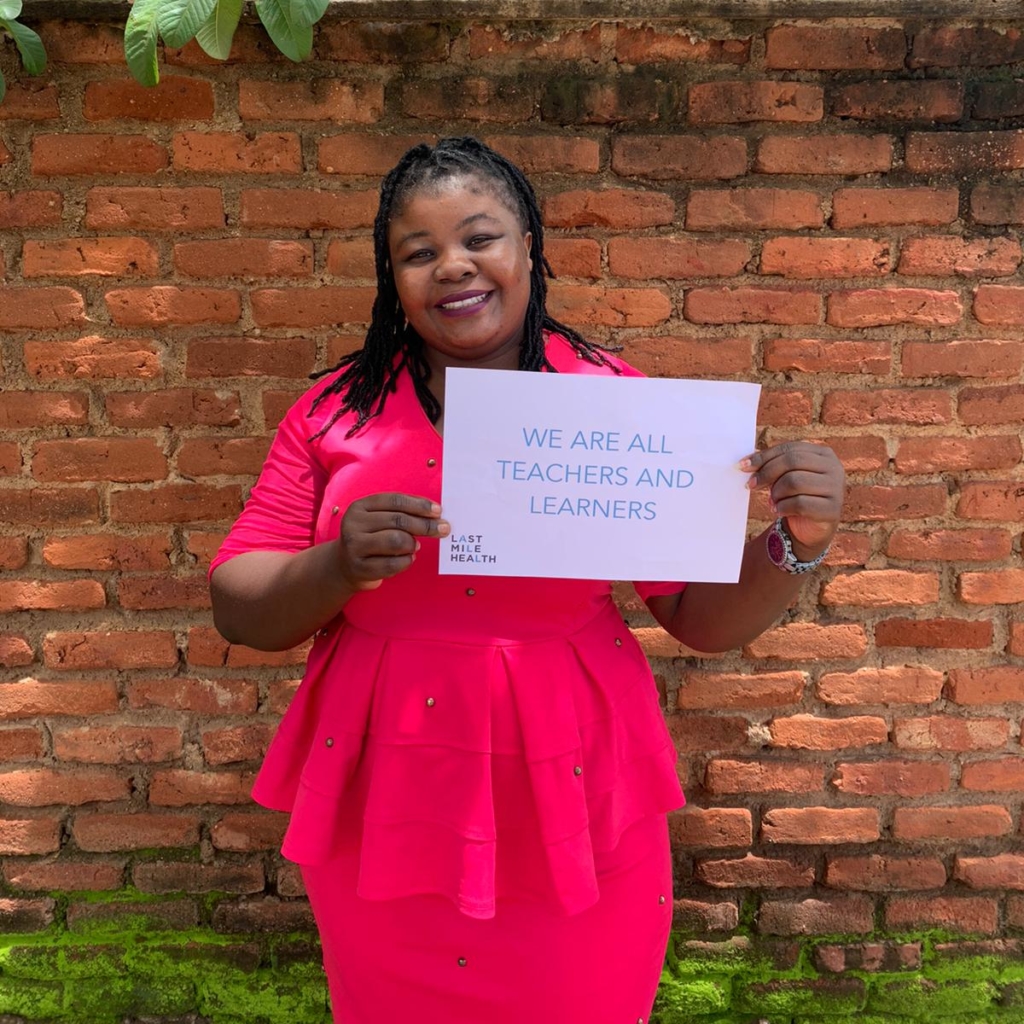 Abigail Mphatso Nyaka works for Last Mile Health as a Program Manager in Malawi. In this capacity, she has been overseeing Last Mile Health’s COVID-19 response in Chikwawa District, including coordinating with the District Health Management Team to plan community health worker training, and identifying opportunities to support digital health interventions and community engagement activities. Here, Abigail reflects on Last Mile Health’s values, and explains which one resonates with her the most.
Abigail Mphatso Nyaka works for Last Mile Health as a Program Manager in Malawi. In this capacity, she has been overseeing Last Mile Health’s COVID-19 response in Chikwawa District, including coordinating with the District Health Management Team to plan community health worker training, and identifying opportunities to support digital health interventions and community engagement activities. Here, Abigail reflects on Last Mile Health’s values, and explains which one resonates with her the most.
We are all teachers and learners.
In the book Thanks for The Feedback: The Art and Science of Receiving Feedback Well, Douglas Stone and Sheila Heen highlight how we swim in an ocean of feedback, and that we usually dismiss it despite knowing its importance. The reason is often that we have an internal conflict: we want to learn and grow, but at the same time, we want to be accepted just as we are right now. The book explains why getting feedback is crucial, yet so challenging to accept.
This does not just end here, as it also goes hand in hand with one’s flexibility to learn new ideas. Since joining Last Mile Health, one of the values that resonates with me the most is we are all teachers and learners, recognizing the importance of utilizing diverse experience from our partners to contribute to our work. This is even more essential during a crisis. During COVID-19, transparency and sharing information based on facts is important—I have listened to a lot of voices from the district hospital, partners, and stakeholders; learned from them; and used that information to guide district engagement in the response.
Since 2019, Last Mile Health has been supporting Malawi’s Ministry of Health to strengthen its delivery of the national community health strategy. With COVID-19 posing a threat to the delivery of healthcare, this work has recently pivoted to focus on preparing community health workers to prevent, detect, and respond to COVID-19, while ensuring that the health system is equipped to continue offering routine services.
We know that health for all cannot be achieved alone and instead requires an ecosystem of partners willing and ready to advance a shared mission. Before COVID-19 began spreading around the globe, we were working with the Community Health Services Section to understand where a partnership with Last Mile Health could have the most impact. Being new in the country, we had a lot of information to learn as such we availed ourselves, tirelessly knocked into the Ministry of Health’s various offices to have meaningful conversations that will inform the broader programming.
Through collaboration and engagement with the Ministry of Health at the start of the COVID-19 pandemic, Chikwawa District was recommended as the first district to target for implementation by the Community Health Service Section. They had identified Chikwawa District by looking at districts without a major community health partner to the Ministry of Health, with regional spread of COVID-19, and many residents living at the last mile. At the onset of the COVID-19 pandemic in Malawi in early April, Chikwawa District was among the first three districts to have a positive COVID-19 case, which added to the urgency of our shared work.
Before our work, I only had little idea about Chikwawa District, let alone the lower-shire-valley as a whole (which is located in the south west of Blantyre, with a river called Shire that enters its final phase to join Zambezi River in Mozambique.) To me, Chikwawa was a district where I heard there was a lot of cattle and was also prone to floods. I had a lot to learn.
Since beginning our work in Chikwawa, we have continued to listen and learn from both the District Health Office and the Ministry of Health. In the summer, we heard that the district needed more personal protective equipment for health workers. So in August, we donated more than 900,000 pieces of personal protective equipment to the Ministry of Health, including masks, gloves, and goggles. Before procuring and distributing this equipment, we worked with the Ministry to align our efforts and ensure additional resources and equipment for the districts with the greatest need – including Chikwawa.
Based on the number of facilities in Chikwawa District, our team planned to distribute similar quantities of items across all the 15 health facilities in the district regardless of catchment population size. The district was consulted on the final distribution sheets, and my discussion with the District Medical Officer and Nursing officer made me realize the need for equitable distribution. They advised that the personal protective equipment should be distributed based on catchment area populations, as bigger populations require more service delivery and therefore more personal protective equipment. They also advised that we reach out to the health facilities supported by the Christian Health Association of Malawi, which are privately owned and regulated by the mission hospitals. This was my ‘aha’ moment; I asked myself, ‘what happened to geographical equity and access in my thinking?’ Instead of just 15 health facilities receiving the same amount of personal protective equipment, we were able to equitably support 21 health facilities. This made me realize that we are learning every day, and we always need to be open-minded and practice humility in embracing feedback.
Change can be difficult. But the most key thing is to listen to other voices for feedback. Workplace values drive the attitudes and behaviors that you want to see. At Last Mile Health, we are all teachers and learners: we learn more from the communities we serve. The patients, guardians, and partners are often our greatest teachers.




